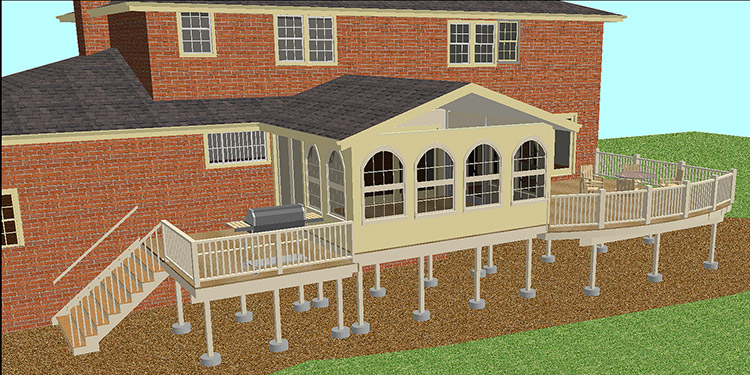Why Having a Permit is so Important When Building a Deck
We get this at least once a week. "I spoke to a contractor who can start in 2 weeks and says I don't need a permit."
So why do you need a permit ?
In a nutshell: it’s the law.
All deck projects must be reviewed by your local jurisdiction to ensure they comply with the current International Residential Code (IRC). The IRC sets out minimum regulations for construction projects related to residences, including provisions for building, plumbing, mechanical, fuel gas, energy, and electrical. The goal is to ensure that all construction is safe, built correctly, and up to the current building standards.
Getting a permit is a fairly straightforward process for a deck, as long as you’re working with an experienced contractor. In most cases, a deck will qualify for the Fast Track, which means you can be granted the permit on the same day.
There are only two reasons why your permit for a deck may be denied.
1. The project doesn’t comply with zoning restrictions.
For example, let’s say your house is 10 feet from the back of the property line. If the zoning for your area says that you can’t build within 10 feet of the property line, then your project will be denied.
2. Your plans are incorrect.
If your plans are not drawn up correctly, then the county can request that you make additions or modifications. In this case, you can fix the problem and still move forward with the project.
By working with an experienced deck contractor, you’ll be less likely to face problems or delays related to a permit. A good contractor will contact the county in advance to get the zoning for each project, and they’ll know permit requirements inside and out, helping ensure your plans meet the county’s needs the first time.
What Are the Consequences of Not Getting a Building Permit for a Deck?
So what happens if you move forward with a deck project that doesn’t have a permit and then you’re caught?
1. Immediate shut down of your project.
You’ll find a big orange Stop Work Order sign on your door. This sign informs workers that they cannot continue the construction, or they will face fines and penalties. Your project will be left as it is until the issue is resolved.
2. You’ll pay fines.
The property owner and the contractor may have to pay significant fines. Depending on your area, the cost can be 3 to 10 times the cost of getting the permit.
3. You’ll still need to get a permit.
In additional to the fines, you’ll have to pay for the cost of the permit. In most cases, your contractor won’t have a set of proper plans as required by your county, so you’ll have to pay for those and wait until they are put together. If it’s a rush job, it will cost more, and in most cases, it will set you back around two weeks.
4. You may need to find another contractor.
In order to get a permit, your contractor must be properly licensed with the municipality (which usually also means they are bonded and insured). If your contractor isn’t, then you’ll need to find someone who is.
5. You’ll face inspections.
Someone will come out to ensure the work that’s been done so far is up to code. If the inspectors can’t see what they need to, they can require you to take apart portions to give them the access they need. For example, if you’ve already put up drywall, they won’t be able to see if the framing was done correctly, so you may have to tear down the drywall. You’ll likely also face increased scrutiny since your project was initially unpermitted.
6. You may be required to make repairs or even tear everything down.
If they find that something is not up to current codes, you’ll face the additional time and cost of making repairs, and in some instances, you may even have to demolish all the work that was completed and start anew.
If you’re not caught initially, the issue can still come back to haunt you when it comes time to sell the home. Also, if a fire or other problem originates from a deck that was constructed without a permit, some insurance companies won’t cover the claim.
By getting a deck permit, you can rest assured that your deck is truly safe and up to current codes. You don’t need to take your contractor’s word; you’ll know that it met and passed inspection from qualified professionals. It’s a way to protect both your investment and your family.




